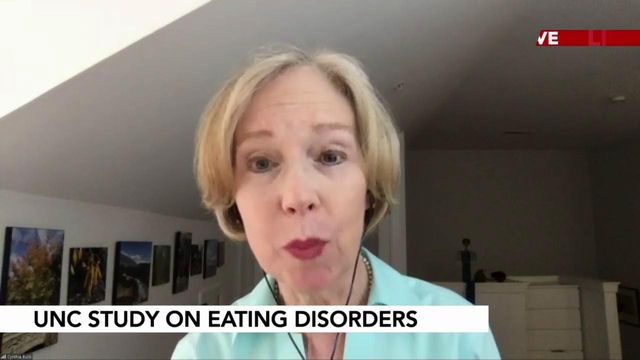As cases skyrocket during pandemic, UNC-Chapel Hill launches massive study on the genetics behind eating disorders
Researchers at UNC-Chapel Hill hope to uncover the genes that could provide answers to why some people are at a higher risk of developing an eating disorder.
Posted — UpdatedThis month, they launched what they're calling the world's largest genetic research study that aims to uncover the hundreds of genes that could predispose some to anorexia nervosa, bulimia nervosa and binge-eating disorder.
Now they're working to sign up 6,000 people, ages 18 and up, who have had a first-hand experience with these eating disorders to help.
The new study is called the Eating Disorders Genetics Initiative. It comes after another program, the Anorexia Nervosa Genetics Initiative, revealed both psychiatric and metabolic origins of the eating disorder and explained why people living with it have trouble gaining weight, despite their best efforts, according to a press release. That study identified eight regions on the genome that are associated with the illness.
“Our new study, EDGI, offers us a unique opportunity to further investigate the complex interplay of genetic and environmental factors that contribute to eating disorders, in order to improve diagnosis, management and treatment – an endeavor that is evidently even more critical during the current pandemic,” said Cynthia Bulik, a distinguished professor of eating disorders at UNC-Chapel Hill and principal investigator of the new study, in a press release.
In a separate survey, Bulik found that two-in-three respondents said they are more concerned about their mental well-being more than they are about the impact of COVID-19 on their physical health.
“Individuals with current, or past experience of an eating disorder face unique risks due to the current pandemic," Bulik said in the press release. "While COVID-19 related factors, including the effects of quarantining, lack of clear information, and fear of infection, will influence the broader community’s mental health, they are likely to further impact those battling pre-existing mental illnesses, such as eating disorders."
For the new study, researchers will analyze DNA from participant's saliva samples to look for specific genes that are associated with eating disorders, according to the press release. Genetic variants will then be studied for possible associations with eating disorders by comparing the genomes of those with eating disorders and those without.
“Learning more about the genes involved in the development of eating disorders should open the door to more effective prevention, diagnosis and treatment, while hopefully challenging common misconceptions of the potentially devastating mental illnesses,” Degener said in the release.
- National Eating Disorder Association – Call (800) 931-2237, Crisis text 741741
- National Association of Anorexia Nervosa (ANAD) – Call (630) 577-1330.
Related Topics
• Credits
Copyright 2024 by Capitol Broadcasting Company. All rights reserved. This material may not be published, broadcast, rewritten or redistributed.





